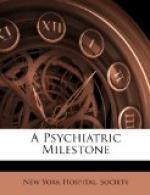This halt in evolution can be connected with different physiological causes, hereditary weaknesses of origin, infections, intoxications, disorders of internal secretions, disorders of the sympathetic system. These diverse etiologies will most likely be of use later to distinguish between forms of these diseases; but to-day the common character of neuroses and psychoses is that this diminution of vitality bears upon the highest functions of self-government.
Whatever be the disorders you may consider, aboulias, hysterical accidents, psychasthenic obsessions, periodical depressions, melancholics, systematized deliriums, asthenic insanity, you will always find a number of facts resulting from this general perturbation.
In plenty of cases, the acts, far from being diminished, appear exaggerated; the patient moves about a great deal, he accomplishes acts of defense, of escape, of attack, he speaks enormously, he seems to evoke many remembrances and combine all sorts of stories during interminable reveries. But pray examine the value and the level of all these acts; they are mere gestures, shocks of limbs, laughter, sobs, reactions simply reflex or perceptive, in connection with immediate stimulation, with inhibition, without choice, without adaptation by reflection. The thoughts that fill these ruminations are childish and stupid, just as the acts are vulgar and awkward; there is a manifest return to childhood and barbarism. The behavior of the agitated individual is well below that which he should show normally. It is easy to explain these facts in the language we have adopted. The agitation consists in an activity, more less complete, in inferior tendencies very much below those the subject should normally utilize.
It is that in reality the agitation never exists alone, it is accompanied by another very important phenomenon which it dissimulates sometimes, I mean the depression characterized by the diminution or the disappearance of superior actions, appertaining to the highest level of our hierarchy. It is always observed that with these patients certain actions have disappeared, that certain acts executed formerly with rapidity and facility can no longer be accomplished. The patients seem to have lost their delicacy of feeling, their altruism, their intelligent critique. The stopping of tendencies by stimulation, the transformation of tendencies into ideas, the deliberation, the endeavor, the reflection; in one word, both the moral effort and the call upon reserves for executing painful acts are suppressed. There exists visibly a lowering of level, and it is right to say that these patients are below themselves.
The two phenomena, agitation and depression, are almost always associated in neuroses as well as in psychoses. It is likely that their union depends upon some very general law, relating to the exhaustion of psychological forces. It is probable that the superior phenomena exact under a form of concentration, of particular tension, much more power than acts of an inferior order, although the latter seem more violent and more noisy. “When the force primitively destined to be spent for the production of a certain superior phenomenon has become impossible, derivations happen, that is to say, that this force is spent in producing other useless and especially inferior phenomena."[17]




